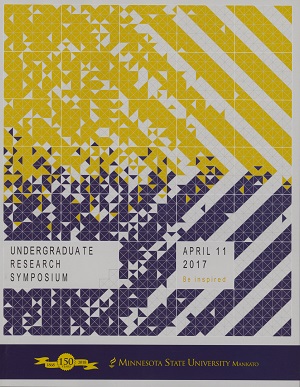The Stigma of Sex Work and Criminalization: Its Impact on Victim Blame and Empathy
Location
CSU Ballroom
Start Date
11-4-2017 2:00 PM
End Date
11-4-2017 3:30 PM
Student's Major
Psychology
Student's College
Social and Behavioral Sciences
Mentor's Name
Eric Sprankle
Mentor's Department
Psychology
Mentor's College
Social and Behavioral Sciences
Description
The purpose of this study was to explore sex worker stigma, specifically regarding the effect their job title and criminalization status may have on victim blame and empathy. Although the negative effects of sex work criminalization have been well-documented in qualitative research, it has not been experimentally tested. Utilizing a 2 (professional dominatrix, professional naturopath) x 2 (legal, illegal) experimental design, 363 undergraduate participants were randomly assigned to 1 of 4 conditions. Participants were asked to read a news article describing a sexual assault in which the aforementioned variables were manipulated to describe the survivor's job and her job's legality. After reading the article, participants completed the Victim Empathy Scale. Results indicated no significant differences between conditions. However, 47% of the sample failed a basic, two-question manipulation check of the independent variables. After excluding that data, results now indicated main effects for both independent variables. The women working as sex workers were blamed for their own assault significantly (p < .05) more than non-sex workers. Additionally, those working illegally were blamed significantly (p < .05) more for their assault than those working legally. There was no significant interaction. The results of this study add to the qualitative data regarding the reality of sex work stigma, it's real-world consequences of victim blaming, and the effects of criminalization. Limitations include using a convenience sample, especially toward the end of the semester when careless reading and responding were evident. Future research should focus on more targeted sampling to reduce validity concerns.
The Stigma of Sex Work and Criminalization: Its Impact on Victim Blame and Empathy
CSU Ballroom
The purpose of this study was to explore sex worker stigma, specifically regarding the effect their job title and criminalization status may have on victim blame and empathy. Although the negative effects of sex work criminalization have been well-documented in qualitative research, it has not been experimentally tested. Utilizing a 2 (professional dominatrix, professional naturopath) x 2 (legal, illegal) experimental design, 363 undergraduate participants were randomly assigned to 1 of 4 conditions. Participants were asked to read a news article describing a sexual assault in which the aforementioned variables were manipulated to describe the survivor's job and her job's legality. After reading the article, participants completed the Victim Empathy Scale. Results indicated no significant differences between conditions. However, 47% of the sample failed a basic, two-question manipulation check of the independent variables. After excluding that data, results now indicated main effects for both independent variables. The women working as sex workers were blamed for their own assault significantly (p < .05) more than non-sex workers. Additionally, those working illegally were blamed significantly (p < .05) more for their assault than those working legally. There was no significant interaction. The results of this study add to the qualitative data regarding the reality of sex work stigma, it's real-world consequences of victim blaming, and the effects of criminalization. Limitations include using a convenience sample, especially toward the end of the semester when careless reading and responding were evident. Future research should focus on more targeted sampling to reduce validity concerns.
Recommended Citation
Kunerth, Elliott and Kelsi Pettit. "The Stigma of Sex Work and Criminalization: Its Impact on Victim Blame and Empathy." Undergraduate Research Symposium, Mankato, MN, April 11, 2017.
https://cornerstone.lib.mnsu.edu/urs/2017/poster-session-B/30




